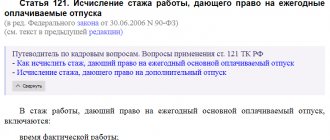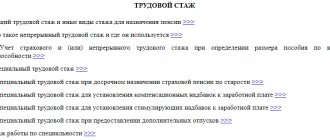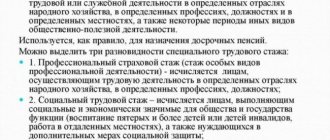The concept of “total length of service” (GTS) cannot be found in the current legislation of the Russian Federation. This is a kind of rudiment of the old, Soviet pension system, when all working citizens received the right to payments. The TTS represents the entire set of work activities in time terms.
After the 2002 reform, the purpose of which was to bring the country’s pension system to the insurance model, the term “work experience” is practically not used. Pensions began to be calculated using new bases and formulas. The basis for its calculation was the insurance period, which should be understood as the periods during which special contributions were paid for a citizen to his personal account in the Pension Fund.
This responsibility rests with the employer. Since 2015, after another reform, material assets transferred to the Pension Fund have been transferred according to a special formula into special points, the number of which depends, first of all, not on the duration of the work itself, but on the volume of funds transferred directly to the Pension Fund.
Despite the above, it can still be taken into account for calculating pensions, especially for persons who began working before 2002.
What is included in work experience
It may include certain periods during which the citizen performed duties related to his work activity. In addition, this should also include other periods of time when the employee, being employed, was not engaged in the performance of official duties, but they were counted toward his length of service.
The OTS counted all “working” periods in the chronological period. If a citizen’s work experience was interrupted, then no reset occurred, since from the moment of new employment the OTS continued to flow further.
Periods included in the length of service
The following forms of activity should be included on a general basis in the period considered here:
Carrying out labor activities
Any official work, regardless of its nature, is included in the OTS. It should be noted that the location of the relevant activity matters. This should be the territory of the Russian Federation.
However, in some cases, the Pension Fund of Russia may also take into account the time spent working abroad , for example, in representative offices of Russian government agencies abroad or if there is a corresponding international (bilateral) agreement between our country and a foreign state.
Attention! For work to be counted, the employee must be officially employed. Periods of work without supporting documents are not counted.
Time of incapacity
This includes periods when the employee did not perform a labor function due to illness or caring for a sick family member, which should have been confirmed by sick leave from a doctor.
Being in MLS
In the case where a citizen was placed in a pre-trial detention center, but subsequently the criminal prosecution was terminated, then the entire period of stay there is included in the TTS. The same applies to being in prison after a conviction, if the prisoner was later rehabilitated.
Public Works
In this case, we are not talking about volunteering, but about paid work.
Unemployment
Provided that the citizen was registered with the Central Tax Service and had the appropriate official status.
Military service
The OTS includes service in the Armed Forces of the Russian Federation, as well as other structures equivalent to them.
Maternity leave
Maternity leave is included in both the length of service and the insurance period.
Baby care
The OTS includes the time of care until the child reaches the age of three years, the insurance – 1.5 years.
Studying at a university or college
This time was taken into account in the corresponding calculation previously, but at the moment the training cannot be counted.
How to use the calculator
Instructions for using the experience calculator
- If you know your length of service as of a certain date, then enter in the “Experience as of date” field the specific day and the number of years, months, days of experience as of that day. These fields are optional, but if you have this data, it will significantly reduce your calculations.
- In the “Date of hiring” and “Date of dismissal” fields, enter your dates, for example, according to your work book. You must fill out at least one line of this table.
- The “Additional periods” may include such periods as: being in the state or municipal service, the period of work as an individual entrepreneur, the period of receiving unemployment benefits, caring for a disabled person or an elderly relative, and others. The full list of such periods is described below, in the paragraph “What is included in the insurance period”.
- Select the desired value from the drop-down lists if you served in the military or were on maternity leave.
- Click "CALCULATE". You can save the result as a doc file.
Please also take into account:
- Use the Today button (circle with a dot) to quickly insert the current date.
- Use the appropriate buttons to add, delete and clear required fields for faster and more convenient entry and change of information.
What is special work experience?
This term should be understood as the total period of labor activity in particularly difficult conditions. This especially includes working in hazardous industries and in unfavorable climatic conditions. In addition, special experience is also calculated for teaching staff, as well as doctors, paramedics and nurses, regardless of specialization.
Attention! The periods of time during which special work experience was carried out must have papers confirming these facts.
There is also such a concept as “continuous work experience”. It should be understood as the period when the citizen worked continuously. For a long time, the amount of temporary disability benefits, as well as some other payments, depended on this parameter. Currently, the fact of continuous work activity is not legally significant.
Why is it important to correctly calculate your insurance period?
Incorrect calculation of length of service may result in claims from authorized bodies. Thus, the period of an employee’s work in the organization is reflected in the SZV-STAZH form, submitted annually to the Pension Fund of Russia. For providing false information, the employing company is subject to a fine of 500 rubles. for each insured employee. In addition, a fine is provided for officials - from 300 to 500 rubles.
As for length of service for social insurance purposes, the amount of benefits depends on it. Consequently, distortion of the duration of an individual’s work may lead to an error in calculations. As a result, the amount claimed for reimbursement from the Social Insurance Fund will be incorrect. If an incorrect length of service inflates the benefit amount, an arrears in insurance premiums will appear when the error is discovered. Arrears, in turn, entail the obligation to pay fines and penalties to the budget. Also, if the insurance period is incorrectly indicated in the PVSO register in the regions participating in the Direct Payments project, then the regional branch of the Social Insurance Fund will incorrectly calculate the amount of the benefit.
How to calculate total work experience
The duration of an employee’s compulsory labor insurance is confirmed by such an important document as a work book. If the information specified in it is not entirely complete, then other supporting documents are used, such as:
- contracts;
- orders;
- certificates;
- salary slips.
To calculate, the following generally accepted rule is used: a period of 360 days is considered for one year, and a period of 30 days is considered for 1 month, regardless of calendar calculation.
The calculation procedure is quite simple. Based on documents containing relevant information, it is necessary to find out and write down the start/end dates of working periods. Then the duration of each of them must be determined with an accuracy of one day. After this, the resulting periods are summed up to the nearest year, month and day. This calculation has been used previously.
What happens if you haven’t earned points and length of service for your insurance pension?
In this case, a social pension is provided for by Federal Law of December 15, 2001 N 166-FZ. But you can get it five years later than reaching the retirement age that is in effect at a particular moment. In 2021, women can claim social benefits from 61.5 years old, men - from 66.5. The size of pensions also differs. If the average insurance is 16,790 rubles, then the social insurance is 9,848 rubles.
But the state leaves citizens the opportunity to “purchase” both length of service and pension points. True, you can pay for no more than half of the required experience. An exception is made for the self-employed: they can buy as many years as they want.
To add a year of work to yourself, you need to make a minimum contribution amount, which is calculated using the formula:
Payment for a year of work = minimum wage as of January 1 of the year for which money is paid x 12 x 22%.
In 2021 it is 33,770.88 rubles. This amount will give 1.0478 points to the IPC. If you want more points, you can deposit more money. But no more than eight times the minimum contribution. To pay for experience and points, you need to contact the Pension Fund.
How is length of service taken into account when calculating pensions?
The basis for assigning old-age benefits is reaching the required age. In 2021, it is 55.5 and 60.5 years for women and men, respectively . In addition, you must have a sufficient number of pension points. The insurance period, the period during which contributions were paid for the employee, also plays a significant role.
The OTS itself does not affect the assignment of a pension. However, given that the vast majority of people who are about to retire, as well as those planning to end their working career in the coming years, began working before 2002, this is of great importance for them. This is due to the fact that until 2002, pension rights were formed exclusively on the basis of the TTS, which will be taken into account when calculating material payments.
In addition, the special working period affects the right to preferential (early) receipt of pension payments for certain categories of persons.
Reference! After 2002, all citizens were registered in the compulsory pension insurance system, and therefore all periods that were discussed in the article above are counted only in the insurance period.
The length of total work experience is not considered by modern Russian legislation as the main factor for calculating old-age benefits (with the exception of periods of work before the pension reform of 2002). The insurance model of pension provision presupposes other grounds for receiving financial support in old age, depending, in addition to the length of work, on the volume of transfers to the Pension Fund.
Duration counting
Pension Fund employees are responsible for the correct calculation of total length of service. But you shouldn’t rely only on their efficiency and attentiveness. Very often, problems arise with taking into account the time of employment before 2002, periods of caring for a child, a disabled person, etc. Before applying to the Pension Fund for a pension, make the calculations yourself. If, after calculating your pension, you find a “shortage”, contact the Pension Fund with documents confirming the correctness of your calculations: a work book, certificates from places of work and from the employment center.
How to confirm pension rights
The main document is a book with marks of employment, it is used to calculate the length of service for retirement, it can also be seen from the extract from the personal account in the Pension Fund of the Russian Federation when maintaining an electronic book. If the records are difficult to make out or they are inaccurate, or the employer did not make an entry in the Labor Code, the fact of work is confirmed by other documents.
The easiest way to find out whether the Pension Fund has taken into account all periods of employment is to go to the citizen’s personal account on the department’s website or look in government services.
If the book is lost, there are no entries in the ETC and other shortcomings, they request certificates from employers, copies of contracts and orders on hiring and dismissal, archival certificates and extracts from employers’ accounting documents.
If the employer loses primary salary documents, follow the recommendations of the Ministry of Labor and the Pension Fund of the Russian Federation (letter of the Ministry of Labor of the Russian Federation No. 8389-YUL, Pension Fund of the Russian Federation No. LCH-06-27/9704 dated November 27, 2001).
Controversial and difficult situations
Conflicting opinions arise regarding some periods. And it is not always clear whether to exclude them from the length of service that gives them the right to paid leave, or, conversely, to include them.
Vacation period followed by dismissal
It should not be confused with the vacation period during which the employee wrote a letter of resignation - such a period is included in the vacation period on a general basis.
As for leave followed by dismissal, opinions differ on it.
If we rely on the Determination of the Constitutional Court of the Russian Federation dated January 25, 2007 No. 131-О-О, then we can come to the conclusion that the time of vacation followed by dismissal is not included in the vacation experience, although this is not directly stated in the document.
The court gives several reasons in favor of its decision: it points out that “the last day of work of the employee in this case is not the day of his dismissal (the last day of vacation), but the day preceding the first day of vacation.” On this day, the employee is given a work book and a full payment is made to him. The employment relationship with the employee is effectively terminated, he does not retain his job (position), and he can no longer withdraw his application for dismissal.
On the other hand, Art. 121 of the Labor Code of the Russian Federation states that the length of service giving the right to annual basic paid leave includes the time when the employee did not actually work, but retained his place of work (position), and this article does not make an exception for the period of leave from subsequent dismissal.
Time for mandatory medical examinations
This period applies to certain categories of workers (Article 213 of the Labor Code of the Russian Federation), for example, to drivers who undergo a mandatory medical examination. And this time is included in the vacation period. Moreover, the vacation period also includes the period of suspension from work of an employee who has not passed a mandatory medical examination through no fault of his own.
At the same time, it is necessary to distinguish between the concept of a mandatory medical examination, provided for by law and carried out at the expense of the employer, and a medical examination at the initiative of the employee. Passing a medical examination on your own can lead to dismissal for absenteeism (Appeal ruling of the Moscow City Court dated November 12, 2013 in case No. 33-34857).
Time of forced absence due to illegal dismissal
Sometimes situations happen when an employee is first fired and then reinstated through the courts. The resulting time of forced absence due to the fault of the employer is included in the vacation period. That is, this period is equal to the time of actual work. In this case, it is necessary to correctly determine the boundaries of the working year of the employee who has been reinstated.
Let's say the next working year began on September 20, 2021, and on December 10, 2021, the employee was fired. According to the court's decision, he would be reinstated at work, and on March 10, 2021, he would return and begin performing his official duties again. Thus, the period from December 10, 2021 to March 9, 2021 turned out to be forced absenteeism.
Before dismissal, the employee’s working year was counted from September 20, 2017 to September 19, 2021. And his boundaries will not shift due to illegal dismissal, since the vacation is just another one. Vacation is provided according to the vacation schedule. When an employee is reinstated at work, he has the right to demand that unused vacation be provided to him.
What types of output are there that affect retirement?
Let's consider what length of service is - this is the time of work and socially useful activity of a citizen, which is used to establish a method for calculating the amount of a pension. The calculation method is different and depends on the current legislation.
Until January 1, 2015, pensions were calculated based on total length of service and salary. After 01/01/2015, the Federal Law “On Labor Pensions in the Russian Federation” dated 12/17/2001 No. 173 came into force, and this concept is not applied, the pension is calculated according to the insurance - the periods when contributions to the Pension Fund were deducted, based on points.
The main difference: for general, the periods provided by law are considered, for insurance - only the time of deduction of contributions to the Pension Fund. The pension depends: before 01/01/2015 - on the duration of work, after - on the amount of contributions to the Pension Fund. The cost of a pension point depends on the amount of contributions to the Pension Fund.
Preferential benefits have been preserved - time of work under certain conditions, for which a preferential retirement is entitled. When calculating the amount and determining the right to pension payments, general and special work experience is taken into account; insurance coverage is considered to be employment after 01/01/2015.
The law does not contain the concept of what length of service is; it usually means preferential, and periods of employment with preferential length of service increase several times when calculated. Preferential benefits include harmful working conditions, judicial service, etc., and territorial. There is no definition in the law of what territorial work experience is; it refers to activities in special climatic zones: in rural areas, in the Far North, etc.
So, in accordance with paragraph 4 of Art. 30 Federal Law No. 173, increase the duration for employees:
- in the Far North, in areas equivalent to it, in the zone of the Chernobyl accident - 1.5 times;
- for service in the army, work in leper colonies, anti-plague organizations, work during the Second World War (except for areas of occupation), living in besieged Leningrad, being in a concentration camp - 2 times;
- for participation in hostilities and service in the zone of the Chernobyl accident, treatment of military diseases, work in besieged Leningrad, unreasonable restriction and imprisonment - 3 times.
The Pension Fund identifies the main types:











